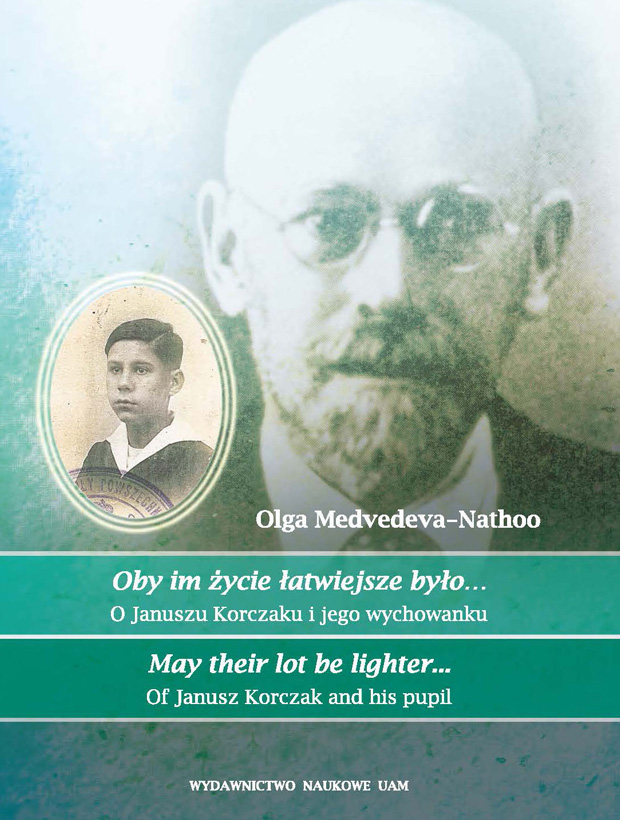Excerpts from the review by Dr. Zbigniew Rudnicki, published in Polish in Studia Edukacyjne Wydawnictwo Naukowe UAM w Poznaniu/Educational Studies, Poznan University Press No 20, 2012, p. 299-302.
With the passage of time, less and less people are around who knew Korczak and witnessed the events of that ever distant past. This is why Olga Medvedeva-Nathoo’s idea to record recollections of one of the last of Korczak’s pupils, Leon Gluzman, is of so much importance.
[…]
The author chose an original way of carrying out her concept: by presenting the educator through the eyes of a child. It seems, at least in the initial chapters of the book, that Leon’s story […] is used just as a pretext for showing Korczak’s fascinating ideas and fruitful educational tools.
[…]
Besides Leon’s oral testimonies, the author made use of various archives: a private collection of the protagonist of the book as well as collections of the Centre of Research and Documentation – Korczakianum in Warsaw, Janusz Korczak’s Archives at the Ghetto Fighter’s Museum in Israel, and Canadian Archives and Library in Ottawa. […] Using the information from these sources the author created a vivid image of everyday life at the Orphanage and Janusz Korczak – the portrayal without any retouching. In turn, the reader became acquainted with a very busy person: a writer, a lecturer, a fundraiser, etc. But above all else, with a man who made everything possible for children in his charge […] such as providing them with a real Home. […] The author described the strong ties that had been built between Korczak and his pupils – none of them had any doubts that they were of the utmost importance to the Doctor.
[…]
Olga Medvedeva-Nathoo depicted in detail one of the most original tools of Korczak’s educational practice, which was awarding children with the Commemorative Postcards as a sign of their efforts to improve their characters and behaviour […] She called these postcards the little bows of memory. Indeed, these cards remained as mementos of children’s happy years at the Home for Orphans and reminded them of their bond with the Doctor.
[…]
Leon’s successful life […] was proof that any criticisms of Korczak’s so called impractical ways of upbringing children and any accusations that they were unprepared to deal with the trials of the real world upon leaving the Orphanage, had no merit.
[…]
Olga’s book is a passionate reading, which rediscovers the uniqueness of Korczak’s legacy against the background of life of one of his pupils. Unlike many other authors who are following the fashionable trend of deconstruction forcefully applying this procedure even to these aspects of Korczak’s life where there was no room for myths, Olga is not trying to demythologize the great educator. Vice versa, her book is full of warmth, humour and fairness. It is a result of the work of the researcher who is able to understand the documents of the history, engaging intellect and evoking emotions.
Here are fragments of the review by Dr. Joop Berding, a Board member of the Janusz Kor czak Association in the Netherlands and Vice Secretary General of the International Korczak Association that was posted in www.korczak.nl
I immensely enjoyed reading this book. It gives valuable insights into the life of one of the hun dreds and hundreds of children that once lived in JanuszKorczak’s orphanage in Warsaw.
Reading this book brings one back to a va nished world, but also to the essence of demo cratic, humane living, and the unconditional respect for children. Wherever he could, Korczak stressed the posi tive and good in the pupil’s behavior, and in this respect the book is unique in the litera ture on Korczak.
[…]
I highly recommend this book for both new comers and those already acquainted with the remarkable world of Korczak.
In 2012 the book May Their Lot Be Lighter… Of Janusz Korczak and His Pupil by Olga Medvedeva Nathoo was also published in Russian.
In the Foreword to this edition, Prof. Roza Valeeva of the University of Kazan and the President of the Janusz Korczak Association of Russia wrote: “This story of one of Kor czak’s pupils helps us immerse ourselves in the everyday life of the Home for Orphans and to witness tangible results of Korczak’s approach to education. With regret, we have to admit that nowadays in most of the institu tions of this kind, factors such as inadequate living space, isolation, lack of contact with people from other social circles, as well as […] too strict control over orphans by educators, […] put obstacles in their full development as independent people.
[…]
This is one of the reasons that this book is highly usuful reading for educators who work at orphanages and similar establishments as well as for students who want to persue their career as educators.”
Dr. Zbigniew Rudnicki

